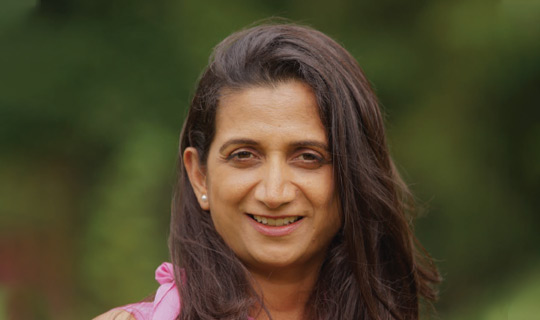"I realize how important the human connection is—for example, when somebody holds your hand during a biopsy, or when you come back from surgery and the nurses put their hand on your head and say everything will be fine. A patient should be treated like a human being and not just a chart."

As an internal medicine specialist, Deval Gadhvi, MD, is usually the one performing exams, ordering tests and fielding patients’ questions. However, her life took a dramatic turn in the spring of 2015 when she felt a mass on her right breast.
Only 39 years old at the time, Dr. Gadhvi lived a healthy lifestyle and had no known risk factors associated with breast cancer. "I don’t drink or smoke, I had my kids young and breastfed them, I’m a vegetarian and I have no family history of breast cancer. I was busy raising my two children, working part-time, preparing for a trip to India and enjoying life," recalls Dr.Gadhvi, who is affiliated with Jersey City Medical Center (JCMC).
Dr. Gadhvi went to a radiologist for a mammogram just to be sure she shouldn’t worry and was shocked when the results showed that the mass looked highly suspicious" I went numb after that," she says. "It was very scary because I just didn't know what would happen next."
An ultrasound-guided breast biopsy, which uses sound waves to help locate a lump and removes a tissue sample for examination, revealed that she had Stage 3 breast cancer. In the months that followed, Dr. Gadhvi underwent a double mastectomy, chemotherapy and radiation.
The treatment was successful: she has been in remission since 2015. However, Dr. Gadhvi says her experience as a cancer survivor has changed her approach to patient care and also given her a new mission.
Words of Caution
"I realize how important the human connection is—for example, when somebody holds your hand during a biopsy, or when you come back from surgery and the nurses put their hand on your head and say everything will be fine," she says. "A patient should be treated like a human being and not just a chart."
Dr. Gadhvi also says she is now better in tune with how her patients are feeling when they are dealing with a difficult health issue. "Even when somebody’s saying "I’m okay,’ I can now sense if there’s still a fear in their voice," she says. "Or when the patient’s family is angry about something, I know it’s often really the fear that’s talking.
Post-cancer, the doctor has also made it her mission to spread the word to patients and women she knows about the importance of screening. "Breast cancer can happen to anyone, even those who are not at high risk,” she says. "It’s so important for everyone to stay on top of their health and get screened."
If you feel a lump, get it checked out, she emphasizes:"Not every lump is cancer, but let your doctor decide that."
"Let's Save Ma"
As part of her mission, Dr. Gadhvi created and funds a charity that offers free breast cancer screenings to women in the Kutch district of western India, here she is from. Called "Let’s Save Ma," the program gets the word out by going into schools and providing children with flyers to pass along to their mothers. Screenings are offered either at screening centers or on "mammogram buses" that she rents in rural areas.
"In India many women don’t talk about breast health and don’t even want to get a mammogram done — it’s a taboo subject," says Dr. Gadhvi, who visits a different village every six months. "It’s partly because they are private about their bodies, but there’s also a misconception that breast cancer is a disease of the western world and that vegetarians don’t get it.
"As a result, breast cancer survival rates in India are much lower than those in the United States, simply because of a lack of awareness. When we get their kids involved, the mothers get the message. About 300 to 400 women receive the free screenings each year.
Dr. Gadhvi is also involved with a program called Red Sari that was started by her husband, Pragnesh Gadhvi, MD, an interventional cardiologist at JCMC, which raises awareness about heart disease in South Asian communities. "Because of their culture, diet and genetic makeup, South Asians are at a higher risk of dying from a heart attack than any other community,” she says.
As part of the Red Sari program, Dr. Gadhvi and her husband visit senior centers, religious centers, schools and community centers in Hudson County to educate people about how to prevent heart attacks. They have also convinced several local South Asian restaurants to change their menus to offer more heart-healthy options. Dr. Gadhvi says she feels compelled to give back because knowledge equals power. "I think it’s important to educate people about their health," she says, "and to create an environment where they’re comfortable enough to ask questions."